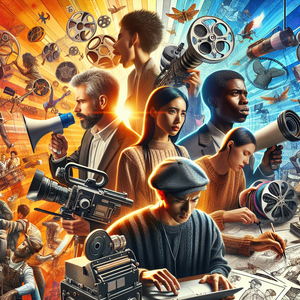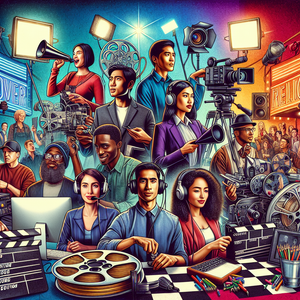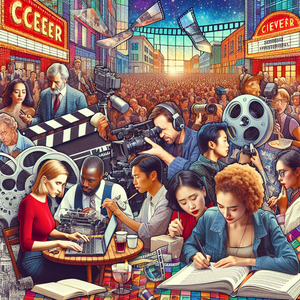
Exploring 15 Promising Career Paths in the Film Industry: Roles, Responsibilities, and What You Need to Succeed
The film industry is not only a place for storytelling but also a vibrant arena for diverse career opportunities that cater to a wide range of interests and talents. As the industry continues to evolve—especially with the rise of digital content and streaming platforms—new roles are emerging alongside traditional ones. This article delves into 15 distinct career paths within the film industry, examining their responsibilities, requirements, and the significance of each role in this dynamic sector. We’ll also highlight trends and statistics that underscore the industry's growth and adaptability, providing insights for those eager to forge a path in film.
Job Summaries:
Production Designer:
- Tasked with crafting the film’s visual landscape.
- Production designers collaborate closely with directors and cinematographers.
- They conceptualize sets, select color schemes, and lead the art department.
- Typically, a degree in fine arts or design is essential.
- An imaginative spirit and solid project management skills are important.
- Their work is pivotal in establishing the film's overall tone and atmosphere.
Sound Designer:
- Sound designers are responsible for the auditory elements of a film, encompassing sound effects, dialogue, and music.
- They play a vital role in post-production, enhancing the emotional depth of scenes through meticulous sound editing.
- A background in sound engineering or music production, paired with expertise in audio software, is crucial for this position.
- This position significantly impacts audience engagement.
Film Editor:
- Editors take raw footage and weave it into a cohesive narrative.
- They cut scenes, select the best takes, and integrate sound and visual effects.
- While a degree in film studies is beneficial, practical experience with editing software is key.
- Editors shape the film’s pacing and emotional resonance, making their role indispensable.
Camera Operator:
- Tasked with capturing the director’s vision
- Camera operators set up shots
- Work alongside lighting technicians
- A background in cinematography or film production is often required
- Technical skills in handling cameras are often required
- Their expertise is essential in visually translating the script
Director of Photography (DoP):
- The DoP is the custodian of a film’s visual style.
- Working closely with the director to achieve the desired look.
- They decide on camera angles and lighting.
- Requires a degree in cinematography and ample experience.
- The DoP’s artistic vision greatly influences the film’s aesthetic and emotional impact.
Line Producer:
- Line producers are the organizational backbone of film production.
- They manage logistics to keep projects on track and within budget.
- Their work includes scheduling, hiring crew members, and overseeing daily operations.
- A background in production management is essential in this role.
- Strong leadership skills are also essential in this role.
Assistant Director (AD):
- The assistant director supports the director in coordinating set operations and managing the cast and crew.
- Their responsibilities encompass scheduling and facilitating communication among departments.
- A background in film production is advantageous, as the AD is crucial for maintaining workflow on set.
Location Manager:
- Responsible for finding and securing filming locations
- Location managers negotiate contracts and permits
- Ensures the settings align with the film’s vision
- A background in film production or project management is beneficial
- Exceptional negotiation skills are beneficial
- This role is vital for creating authentic and visually compelling environments.
Production Assistant (PA):
- Often seen as an entry point into the industry
- Production assistants provide support across various departments
- Their tasks can range from setting up equipment to handling administrative duties
- While formal education isn’t a strict requirement
- Passion for film and organizational skills are key.
Visual Effects (VFX) Artist:
- VFX artists create stunning computer-generated imagery and special effects that enhance storytelling.
- Collaborating with directors and editors, they integrate visual effects seamlessly into the film.
- A degree in computer graphics is typically required, along with proficiency in software like Adobe After Effects.
- This role has become increasingly important in contemporary filmmaking.
Casting Director:
- Casting directors are instrumental in selecting actors for film roles.
- They conduct auditions and negotiate contracts.
- Casting directors work closely with directors to ensure the right talent is matched to characters.
- A background in casting or talent management is often required.
- Strong interpersonal skills are important for casting directors.
- Their choices significantly shape performances and the film's overall quality.
Costume Designer:
- Costume designers craft clothing and accessories that reflect characters’ personalities and the film’s narrative.
- This involves researching styles and sourcing materials while collaborating with directors and actors.
- Typically, a degree in fashion design or costume design is essential, alongside a keen eye for detail and creativity.
Makeup Artist:
- Makeup artists enhance or transform actors’ appearances to fit character requirements.
- Often using special effects makeup.
- Close collaboration with the director is necessary to create looks that align with the story.
- A background in cosmetology or theatrical makeup is often needed for this role.
Script Supervisor:
- Script supervisors ensure continuity and track any changes to the script during filming.
- Their meticulous attention to detail guarantees that scenes are shot according to the script while maintaining consistency across the board.
- A background in film production is beneficial for this role.
Digital Marketing Specialist:
- In an age where digital presence is paramount, digital marketing specialists promote films through online platforms.
- They develop marketing strategies and analyze campaign performance.
- A degree in marketing or communications is often required, along with skills in digital media.
- This role is increasingly vital in building anticipation and reaching audiences effectively.
The film industry offers a plethora of career paths, each catering to a unique blend of skills and interests. For aspiring professionals, understanding the responsibilities, qualifications, and current trends is crucial for navigating this exciting field. Engaging with industry professionals, exploring job openings, and continuously updating skills will enhance career prospects in this ever-evolving environment. Whether you’re drawn to the creative aspects of filmmaking or the strategic side of marketing, there’s a place for you in the vibrant world of cinema.
Explore More Jobs

